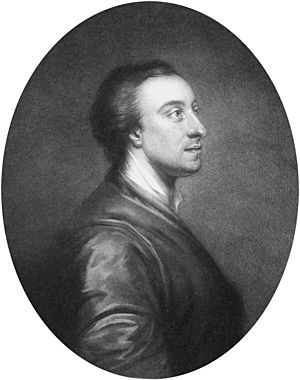Mark Akenside facts for kids
Quick facts for kids
Mark Akenside
|
|
|---|---|
 |
|
| Born | 9 November 1721 |
| Died | 23 June 1770 (aged 48) |
| Nationality | English |
| Occupation | poet, physician |
|
Notable work
|
The Pleasures of the Imagination |
Mark Akenside (born November 9, 1721 – died June 23, 1770) was an English poet and physician. He is best known for his long poem, The Pleasures of the Imagination.
Contents
The Early Life of Mark Akenside
Mark Akenside was born in Newcastle upon Tyne, England. His father was a butcher. Mark had a slight limp his whole life from an injury he got as a child.
His family were Dissenters, a group of Protestants who disagreed with the Church of England. After going to school in Newcastle, he went to the University of Edinburgh in 1739. He planned to study theology to become a minister. A special fund from the Dissenting community paid for his studies.
From Theology to Medicine
After one winter studying theology, Akenside decided to change his path. He switched to studying medicine. He even paid back the money that had been given to him for his theology studies. He also became a deist, someone who believes in God but not in organized religion.
Akenside was elected a member of the Medical Society of Edinburgh in 1740. He hoped to enter Parliament one day because he was a good speaker. In 1741, he left Edinburgh and started calling himself a surgeon.
Akenside's Famous Poem
In 1738, during a visit to Morpeth, Akenside got the idea for his most famous poem. It was a long, teaching poem called The Pleasures of the Imagination. This poem was very popular and was even translated into other languages. People said it had "great beauty in its richness of description and language."
Publishing the Poem
Around 1743, Akenside came to London and offered his poem to a publisher named Robert Dodsley. Akenside asked for £120, which Dodsley thought was too much. However, Dodsley showed the poem to the famous poet Alexander Pope. Pope told him that Akenside was "no everyday writer," so Dodsley agreed to the price.
The first three parts of The Pleasures of the Imagination were published in January 1744. Akenside wrote that his goal was to "enlarge and harmonize the imagination." He wanted to help people think about religion, morals, and life in a similar way. Even though his imagination wasn't always strong enough for such a big topic, the poem was well-liked.
Becoming a Doctor
In 1744, Akenside went to Leiden to get his medical degree. In just over a month, he finished his paper and received his diploma.
After returning to England, Akenside tried to start a medical practice in Northampton, but it didn't work out. He then moved to London and tried to practice medicine in Hampstead. His friend, Jeremiah Dyson, helped him a lot. Dyson even took a house for Akenside in Bloomsbury Square and gave him money so he wouldn't have to worry about his profession.
Medical Career and Recognition
Akenside became a very smart and knowledgeable doctor. He was elected a Fellow of the Royal Society in 1753. He also became a member of the Royal College of Physicians in 1754. He gave important lectures at the college, including the Gulstonian lectures and the Croonian Lectures. In 1759, he gave the Harveian Oration, a famous speech about medicine.
In 1759, he became a physician at Christ's Hospital. However, some people said he was harsh with poorer patients. His serious personality sometimes made it hard for him to succeed, even with his great knowledge.
When George III became king, both Akenside and Dyson changed their political views. Akenside became a Tory, a political group that supported the government. Because of this, he was appointed physician to the queen.
Later Life and Legacy
Mark Akenside died at his house in Burlington Street in 1770. His friendship with Jeremiah Dyson showed a kinder side of his personality. Akenside once wrote to Dyson that their friendship was like "an additional conscience." Their friendship lasted his whole life.
Akenside left all his belongings and writings to Dyson. Dyson published an edition of Akenside's poems in 1772, which included a revised version of The Pleasures of Imagination.
While his poems were not widely read by the early 1900s, his work was known for its dignified and musical qualities.
Works
The most complete edition of Akenside's Poetical Works was put together by Robin Dix in 1996. An earlier important edition was made by Alexander Dyce in 1834.

